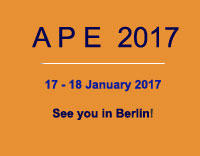As we welcome another year of research and collaboration, we turn our attention to the important questions that surround communicating this research to the world. The Academic Publishing in Europe 12 will be held in Berlin on 17-18 January 2017.
The programme addresses various issues in scholarly communications such as value-added scientific publishing, information dissemination and access to research. The theme this year is Publishing Ethics: Doing the Right Thing – Doing Things Right. The programme broadly focusses on the ethics and principles of academic publishing. It will also discuss Open Access 2020, a move initiated at the Berlin conference in 2015, which calls for all scholarly publishing to be made freely accessible.
The programme touches upon some of the most relevant topics among the scientific community today, such as:
Publication ethics
With the rapidly evolving landscape of publishing and with new platforms and formats coming up every day, it is essential that the ethical principles be maintained and defined. How research is conducted and evaluated, the peer review process, the decision-making process of accepting or rejecting a manuscript, plagiarism and copyright, all of these pose challenges that need to be tackled smartly. There is also the constant debate of whether peer reviews should be kept anonymous or not. There have been several cases of unattributed material, authorship disputes, publication consent, image manipulation, etc. that are taken up by the Committee on Publication Ethics (COPE).
Open Access 2020
While the European Research Council supports the transition of all scholarly publications to open access, there are multiple levels of complexity involved in the process. Making a research paper freely accessible also has to keep in mind the role of the author, the reviewer, the journal and the various other bodies. What can the ERC do to motivate researchers to move towards open access and what would be the implications of publishing their results? What are the drawbacks of the initiative? This is a particularly significant topic which will impact research in Europe in a large way.
Publishing and presenting research
Can there be a better way of presenting research than in the standard way of publishing a research paper? Can there be a collaborative way of presenting research as a narrative? The scientific publishing industry is also still largely using print, and the transition to digital has been rather slow. A large majority of people still prefer reading PDFs as opposed to an HTML page, according to a Naturejobs poll. Newer models of scientific communications are slowly coming into the industry, hoping to replace traditional models.
We at Kolabtree believe strongly that research be made accessible to all, but we also understand the loopholes in the process and the limitations in actually achieving this. As a first step towards making democratizing access to scientific research, our platform allow individuals and organisations access to specialists from all across the globe. Collaboration is one of the answers to improving the quality of the research and industry as a whole, and paving the way for better innovations.
Link to the APE programme here. Let’s work towards empowering the way we publish and present research, and introduce dynamic changes into the scholarly communications ecosystem, without compromising on ethics!
